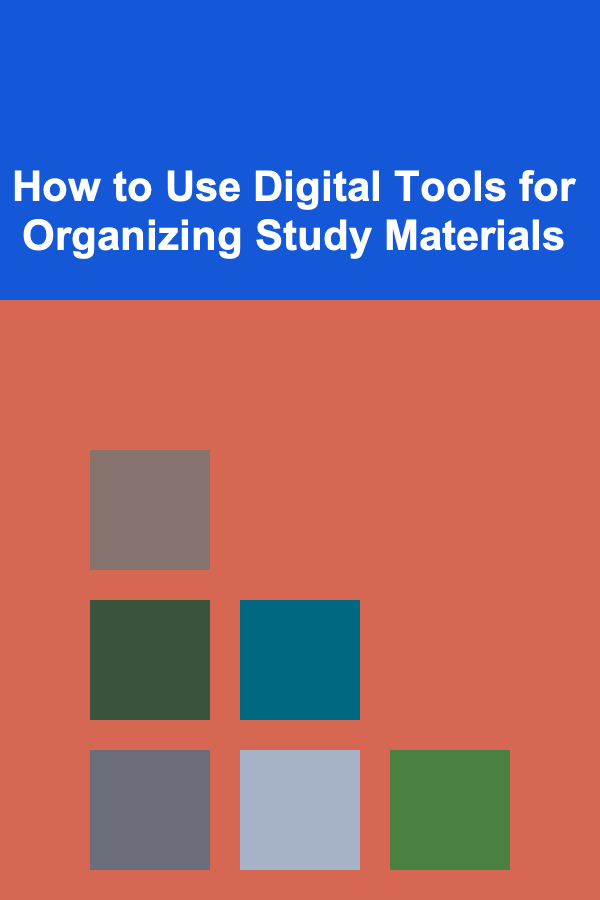
How to Use Digital Tools for Organizing Study Materials
ebook include PDF & Audio bundle (Micro Guide)
$12.99$11.99
Limited Time Offer! Order within the next:

In the digital age, students have a plethora of resources and tools at their disposal to enhance their study habits and organize their materials. With the right digital tools, students can streamline their learning processes, improve retention, and boost productivity. This article will explore various digital tools available for organizing study materials, their functionalities, and best practices for effective use.
Understanding the Need for Organization
1.1 The Importance of Organized Study Materials
Organizing study materials is critical for effective learning. An organized approach not only saves time but also enhances comprehension and retention. When materials are structured logically, students can easily locate information, which reduces frustration and promotes a more focused study environment.
1.2 Challenges in Organizing Study Materials
Despite the benefits, many students struggle with organization due to:
- Volume of Information: The sheer amount of material can be overwhelming.
- Diverse Formats: Study materials can come in various formats---notes, textbooks, articles, videos---which complicates organization.
- Time Constraints: Balancing studies with other commitments makes it difficult to dedicate time to organization.
By leveraging digital tools, these challenges can be mitigated, allowing students to create a more efficient study routine.
Digital Tools for Organizing Study Materials
Digital tools offer versatile solutions for managing study materials. Here's a breakdown of some essential categories:
2.1 Note-Taking Applications
Note-taking applications are fundamental for organizing lecture notes, reading summaries, and personal reflections. Popular options include:
- Evernote: Allows users to create notes that can include text, images, links, and attachments. It offers tagging and notebooks for easy categorization.
- Microsoft OneNote: Features a flexible canvas where students can type, draw, and clip web pages. Integration with Office applications enhances its utility.
- Notion: Combines note-taking with project management. Users can create databases, tables, and kanban boards, making it ideal for organizing complex projects.
2.2 Cloud Storage Solutions
Cloud storage solutions enable students to store, access, and share files from anywhere. Notable examples include:
- Google Drive: Offers 15 GB of free storage and integrates seamlessly with Google Docs, Sheets, and Slides, making collaboration easy.
- Dropbox: Known for its simplicity and ease of file sharing, Dropbox allows for version control and file recovery.
- Microsoft OneDrive: Integrated with Microsoft Office, it provides seamless access to files across devices.
2.3 Task Management Tools
Task management tools help students keep track of assignments, deadlines, and study schedules. Some popular options are:
- Todoist: A task manager that allows users to create projects, set priorities, and track progress over time.
- Trello: Utilizes a board and card system to organize tasks visually; ideal for group projects and collaborative studies.
- Asana: Offers more advanced project management features with timelines and workload management, suitable for larger projects.
2.4 Reference Management Software
For students involved in research, reference management software is crucial for organizing bibliographic data and citations. Key tools include:
- Zotero: A free tool that helps collect, manage, and cite research sources. It can save references directly from the browser.
- Mendeley: Offers PDF organization, citation generation, and social networking features for researchers.
- EndNote: Provides powerful reference management and bibliographic formatting options, ideal for extensive research projects.
2.5 Mind-Mapping Tools
Mind-mapping tools assist in brainstorming and organizing ideas visually. They can be particularly useful for planning essays or projects. Popular tools include:
- XMind: A versatile mind-mapping tool that offers various templates and export options.
- MindMeister: An online collaborative mind-mapping tool that allows for real-time teamwork.
- Coggle: A simple, collaborative tool for creating mind maps with an intuitive interface.
Best Practices for Using Digital Tools
To maximize the effectiveness of digital tools, students should adopt certain best practices:
3.1 Developing a Consistent System
Creating a consistent organizational system across different tools is vital. This could involve:
- Standardized Naming Conventions: Use clear and consistent titles for files and notes to facilitate easy retrieval.
- Color Coding: Implement color coding for different subjects or types of materials to visually distinguish them.
- Folder Structures: Develop a hierarchy of folders or notebooks that reflect your coursework and projects.
3.2 Regularly Reviewing and Updating Materials
Consistently reviewing and updating materials ensures that information remains relevant and organized. Set aside time weekly to:
- Go through notes and tasks to ensure everything is up-to-date.
- Clean out unnecessary files or outdated notes to declutter your digital workspace.
- Revise study materials based on new learnings or shifts in focus.
3.3 Integrating Different Tools for Enhanced Productivity
Using multiple tools in harmony can significantly enhance productivity. For example:
- Linking Google Drive with Notion: Store documents in Drive while managing your overall project timeline in Notion.
- Using Trello with Evernote: Track tasks in Trello while storing detailed notes in Evernote.
- Integrating Zotero with Word Processors: Use Zotero for reference management while writing papers in Google Docs or Microsoft Word.
Case Studies: Successful Use of Digital Tools
To illustrate the practical application of these tools, let's explore a few case studies showcasing successful organization strategies.
4.1 College Student: Organizing Course Materials
A college student majoring in psychology used Notion to organize lecture notes, assignments, and exam schedules. They created separate pages for each course, integrated task lists for assignment deadlines, and utilized calendars to visualize upcoming exams. By centralizing all materials in one platform, they improved their ability to stay on top of responsibilities.
4.2 Graduate Student: Managing Research Projects
A graduate student conducting research in environmental science utilized Mendeley for reference management and Google Drive for document storage. They organized their research papers by topic and used Mendeley to generate citations for their thesis. By maintaining a systematic approach, they streamlined their writing process and reduced time spent on formatting references.
4.3 High School Student: Preparing for Exams
A high school student preparing for final exams implemented a strategy using Trello and Quizlet. They created a Trello board to list subjects, topics to study, and deadlines for completion. Additionally, they used Quizlet to create flashcards for each topic. This combination allowed them to stay organized, focused, and engaged during their study sessions.
Conclusion
The integration of digital tools into study habits can significantly enhance organization and efficiency. By understanding the variety of tools available and implementing best practices, students can create a personalized system that meets their unique needs. Whether through note-taking applications, cloud storage, task managers, or reference software, the potential for improved study outcomes is substantial.
As education continues to evolve in the digital landscape, embracing these tools will not only aid in academic success but also prepare students for future challenges in their professional lives. By adopting a proactive approach to organizing study materials, students can cultivate a more productive and enriching learning experience.

Building Strong Relationships: A Guide to Effective Communication with Customers for Customer Service Representatives
Read More
How to Choose the Right Renovation for Your Home's Layout
Read More
How to Create a Cozy Atmosphere in Shared Spaces
Read More
How to Make Money with Deep Learning Through Freelancing
Read More
How to Partner with Brands for Social Media Endorsements and Partnerships: A Comprehensive Guide
Read More
How to Use Geotargeting to Increase Conversion Rates in Dropshipping Ads
Read MoreOther Products

Building Strong Relationships: A Guide to Effective Communication with Customers for Customer Service Representatives
Read More
How to Choose the Right Renovation for Your Home's Layout
Read More
How to Create a Cozy Atmosphere in Shared Spaces
Read More
How to Make Money with Deep Learning Through Freelancing
Read More
How to Partner with Brands for Social Media Endorsements and Partnerships: A Comprehensive Guide
Read More